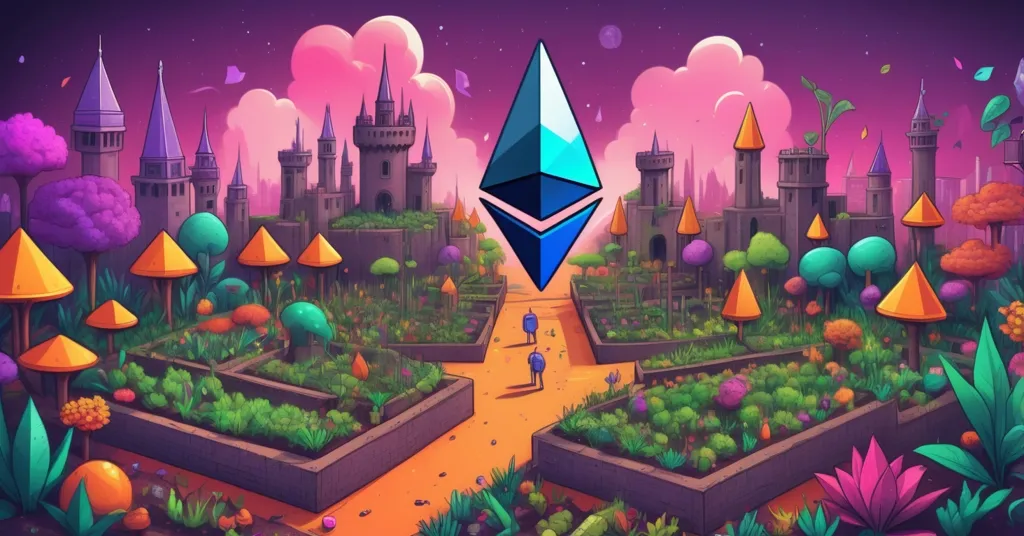Ethereum’s App Ecosystem Stagnates: Time for More Than Tech Upgrades

Ethereum’s Ecosystem Needs More Than Just Technical Upgrades
Ethereum’s relentless pursuit of technical excellence, while admirable, may be overshadowing the need to cultivate a more dynamic and experimental app ecosystem.
- Ethereum’s focus on tech may hinder app ecosystem growth.
- Solana’s success with experimental apps like Pump.fun.
- Ethereum needs to be more open to diverse applications.
- Suggestion for a dedicated team to support new apps.
- Importance of better communication with everyday users.
Ethereum has been the cornerstone of smart contract technology since 2015, continuously pushing the envelope with initiatives like the Dencun upgrade and danksharding, which aim to enhance scalability and reduce transaction fees. These technical enhancements are vital for developers working on the Ethereum platform, but they don’t light a fire under the average internet user or the thrill-seeking ‘degen’ looking for the next big thing in blockchain. ‘Degen’ apps, by the way, are those experimental, high-risk/high-reward projects often associated with speculative trading or gaming.
Contrast this with Solana, which has surged ahead by welcoming a wide variety of apps, including the ‘degen’ variety. The platform’s success with apps like Pump.fun underscores a growing interest in experimental projects. As Nirbhik Jangid, a seasoned builder and growth leader in the web3 space, puts it:
Ethereum’s current way of doing things is helping or hurting its ability to attract and keep the people who build these apps.
The concept of the ‘ecosystem police’—vocal critics within Ethereum who scrutinize new app ideas—might be stifling the creative spirit needed to drive user engagement and network growth. This conservative approach stands in stark contrast to Solana’s embrace of diversity, which has fueled its impressive growth in daily active users and transactions.
Ethereum could benefit from being more welcoming to all kinds of projects, even those that seem frivolous or experimental at first glance. Jangid suggests forming a dedicated team within the Ethereum ecosystem to nurture new apps, providing support without the Ethereum Foundation’s direct control. This move could be the spark needed to reignite Ethereum’s app ecosystem and attract a broader user base.
But it’s not just about the apps; it’s also about how Ethereum communicates with everyday users. The platform needs to showcase the practical benefits and real-world applications of its technology. As Jangid emphasizes:
We need to actively work on getting more apps built and more users to try them. This means having a clear plan beyond just improving the technology.
While Ethereum’s technical prowess is unmatched, the rise of platforms like Solana, with its high transaction speeds and focus on consumer applications, highlights the importance of balancing technological development with user engagement. Ethereum’s recent developments, like the introduction of Ethereum ETFs in the USA in 2024, show its potential in bridging traditional and decentralized finance, yet the focus on user experience and accessibility cannot be overlooked.
The challenge for Ethereum is clear: it must adapt its strategy to remain competitive and vibrant. By fostering a more diverse and experimental app ecosystem and improving its communication with everyday users, Ethereum can reignite the vitality of its network and continue to lead the charge in the blockchain revolution.
While Ethereum focuses on technical perfection, we must remember that Bitcoin, the granddaddy of cryptocurrencies, thrives on its simplicity and security. Ethereum’s growth aligns with the principles of effective accelerationism, pushing the boundaries of what’s possible in decentralized technology. Moreover, a thriving Ethereum ecosystem could enhance privacy and financial freedom, aligning with the ethos of decentralization that we at Let’s Talk, Bitcoin hold dear.
Key Takeaways and Questions
- What is the main challenge facing Ethereum’s app ecosystem?
Ethereum’s focus on technical improvements may be hindering its ability to attract and retain app developers, as other networks like Solana support a more diverse range of applications.
- How has Solana’s approach differed from Ethereum’s?
Solana has embraced and supported a wider range of applications, including experimental and ‘degen’ projects, which has led to increased user acquisition and network growth.
- What is the ‘ecosystem police’ and how does it impact Ethereum?
The ‘ecosystem police’ refers to vocal members and influential figures within the Ethereum community who scrutinize and challenge new app ideas, potentially deterring builders from experimenting on the platform.
- What role do ‘degen’ apps play in the blockchain ecosystem?
‘Degen’ apps attract a significant user base interested in experimental and fun projects, contributing to network adoption and growth.
- What action does the author suggest Ethereum take to revitalize its ecosystem?
The author suggests that Ethereum should be more open to various types of apps, create a dedicated team to help new apps grow, and improve communication with everyday users.
- Why is communication with everyday users important for Ethereum?
Effective communication with everyday users is crucial to showcase the practical benefits and applications of Ethereum’s technology, attracting more users and supporting app growth.



